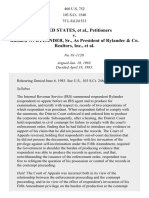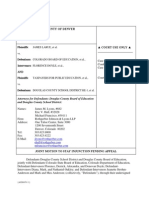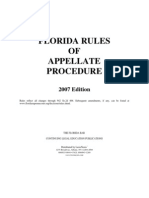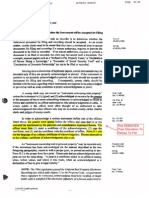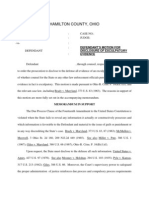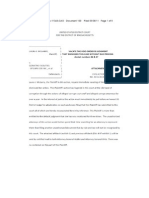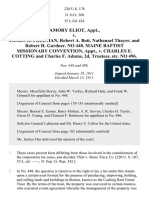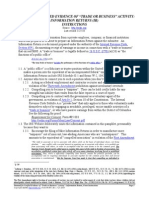Jacqueline Jarrett v. Walter Jarrett, 449 U.S. 927 (1980)
Jacqueline Jarrett v. Walter Jarrett, 449 U.S. 927 (1980)
Uploaded by
Scribd Government DocsCopyright:
Available Formats
Jacqueline Jarrett v. Walter Jarrett, 449 U.S. 927 (1980)
Jacqueline Jarrett v. Walter Jarrett, 449 U.S. 927 (1980)
Uploaded by
Scribd Government DocsOriginal Description:
Copyright
Available Formats
Share this document
Did you find this document useful?
Is this content inappropriate?
Copyright:
Available Formats
Jacqueline Jarrett v. Walter Jarrett, 449 U.S. 927 (1980)
Jacqueline Jarrett v. Walter Jarrett, 449 U.S. 927 (1980)
Uploaded by
Scribd Government DocsCopyright:
Available Formats
449 U.S.
927
101 S.Ct. 329
66 L.Ed.2d 155
Jacqueline JARRETT
v.
Walter JARRETT
No. 79-1735
Supreme Court of the United States
October 20, 1980
Rehearing Denied Dec. 15, 1980.
See 449 U.S. 1067, 101 S.Ct. 797.
On petition for writ of certiorari to the Supreme Court of Illinois.
The petition for a writ of certiorari is denied.
Justice BRENNAN, with whom Justice MARSHALL joins, dissenting.
This petition raises the significant question whether the State may deprive a
divorced mother of the custody of her children through operation of a
conclusive presumption that her cohabitation with an unmarried adult male
constitutes custody not in the best interests of the children, however strong the
contrary evidence. Because the decision below1 conflicts with the import of
relevant precedent of this Court, I dissent from the denial of a writ of certiorari.
In December 1976, petitioner Jacqueline was given custody of their three
daughters, then aged 12, 10, and 7. Jacqueline was also awarded use of the
family home and child support; Walter had visitation rights, and the children
regularly spent their weekends with him. In April 1977, Jacqueline told Walter
that her friend, Wayne Hammon, was going to move into the family home.
Walter objected and one week later filed a custody modification petition,
seeking custody of his children on the grounds that he objected to his ex-wife's
nonmarital relationship and did not wish his daughters to be raised in what he
regarded to be an immoral atmosphere.
Following a hearing at which Jacqueline, Walter, and Hammon testified, the
Circuit Court modified its original decree and granted custody of the children to
Walter, finding the custody change necessary for the "moral and spiritual wellbeing and development" of the children. 78 Ill.2d 337, 342, 36 Ill.Dec. 1, 2, 400
N.E.2d 421, 422 (1979). The Appellate Court reversed, reasoning that the
Circuit Court made no finding and identified no evidence that Jacqueline was
unfit to retain custody and, further, that there was no evidence that the change
in custody was necessary to serve the best interests of the children.
A divided Illinois Supreme Court reversed the Appellate Court and reinstated
the Circuit Court's modified custody decree. Applying the Illinois rule that a
change in custody will be ordered only if necessary to serve the best interests of
the child, the State Supreme Court found that Jacqueline's ostensible violation
of the Illinois fornication statute2 evinced a "disregard for existing standards of
conduct [that] instructs her children, by example, that they too, may ignore
them, and could well encourage the children to engage in similar activity in the
future." Id., at 346-347, 36 Ill.Dec., at 4, 400 N.E.2d, at 424 (citations omitted).
The court, therefore, concluded that retention of custody by Jacqueline
adversely affected the best interests of the children since there was a possibility
of harm to them, even though it might become manifest only in the future, there
being no showing of current actual harm.3 Stanley v. Illinois, 405 U.S. 645, 92
S.Ct. 1208, 31 L.Ed.2d 551 (1972), was distinguished on the ground that
Stanley invalidated a conclusive presumption that an unwed father is unfit to
exercise custody over his children, whereas the conclusion in the instant case
rested not on a conclusive presumption, but on a finding reached after
Jacqueline was afforded a full hearing on the question whether she was an
inadequate parent.
The decision of the Illinois Supreme Court that, in effect, a divorced woman's
ostensible violation of the Illinois fornication statute presumptively harmed the
best interests of the children and that this was conclusive for purposes of
custody presents a serious question under the Fourteenth Amendment. Giving
conclusive effect to such a violation would appear to contravene the teaching of
Stanley v. Illinois :
"It may be, as the State insists, that most unmarried fathers are unsuitable and
neglectful parents. It may also be that Stanley is such a parent and that his
children should be placed in other hands. But all unmarried fathers are not in
this category; some are wholly suited to have custody of their children. . . .
Given the opportunity to make his case, Stanley may have been seen to be
deserving of custody of his offspring." Id., at 654-655, 92 S.Ct., at 1214
(footnotes omitted).
I had supposed that Stanley established the proposition that "the interest of a
parent in the companionship, care, custody, and management of his or her
children," id., at 651, 92 S.Ct., at 1212, cannot be determined by the
evidentiary shortcut of a conclusive presumption. Thus, for purposes of this
case, Stanley would seem to foreclose custody modification on the basis of a
similar conclusive presumption of serious adverse effect on the children's best
interests despite whatever contrary evidence may have been or might be
adduced. This is particularly true since there is no rational basis for the
conclusive presumption actually utilized, whether Jacqueline is viewed as
having violated the fornication statute only or as being a lawbreaker generally.
Nothing in the record or in logic supports a conclusion that divorced parents
who fornicate, for that reason alone, are unfit or adversely affect the well-being
and development of their children in any degree over and above whatever
adverse effect separation and divorce may already have had on the children.
Illinois seldom, if ever, enforces its fornication statute4 and therefore can hardly
contend that there is a rational correlation between divorced parents who
fornicate and divorced parents who impair the healthy development of their
children.
Nor can Jacqueline be presumed to have an adverse effect on her children's
well-being because she is a lawbreaker, for surely such a presumption would be
irrationally overbroad. It would make no sense to treat murder, fornication, and
traffic violations similarly for purposes of custody and modification. If Illinois'
enforcement record is an indication of how important it views violations of
various laws, it appears that Illinois attempts to enforce its traffic laws more
frequently than its "seldom-enforced fornication statute." 78 Ill.2d, at 352, 36
Ill.Dec., at 7, 400 N.E.2d, at 427 (Moran, J., dissenting). If Jacqueline had
violated Illinois' traffic laws, she might have lost her driver's license, but surely
not custody of her children.
10
Moreover, not only is there no basis for conclusively presuming that
Jacqueline's cohabitation would adversely affect her children sufficiently to
justify modification, but also any such conclusion is unequivocally rejected by
the record which affirmatively shows that the "children were healthy, well
adjusted, and well cared for." Id., at 351, 36 Ill.Dec., at 6, 400 N.E.2d, at 426
(Goldenhersh, C. J., dissenting). There was no evidence of actual harm; nor was
there evidence, statistical or otherwise, to suggest that the children's current
exposure to their mother's cohabitation might result in harm to them that might
become manifest only in the future. Surely, in any event, it is no more likely
that divorced mothers who fornicate are unfit than are unwed fathers. Thus,
this case squarely presents the question whether the Due Process Clause
entitles Jacqueline to a meaningful hearing at which the trial judge determines,
without use of a conclusive presumption, whether violation of the fornication
statute adversely affects the well-being of the children.
11
Further, we should grant the petition and address the constitutional question it
so clearly presents because the answer to that question has important
implications for many households. The 1978 Census Bureau Statistics cited by
the Illinois Supreme Court reveal that there are 1.1 million households
composed of an unmarried man and woman and that upwards of 25% of those
households also include at least one child. Id., at 345, 36 Ill.Dec., at 4, 400
N.E.2d, at 424. While the statistics do not reveal how many of these households
were formed after a divorce, and with respect to which the noncustodial
divorced parent may be able to seek custody, the crude figures alone suggest
that the custodial pattern is a pervasive one.
12
Accordingly, I dissent from the denial of certiorari and would grant the petition
and set the case for oral argument.
13
Justice BLACKMUN also dissents from the denial of certiorari and would set
the case for argument.
78 Ill.2d 337, 36 Ill.Dec. 1, 400 N.E.2d 421 (1979).
Section 11-8 of the Criminal Code of 1961 provides that "[a]ny person who
cohabits or has sexual intercourse with another not his spouse commits
fornication if the behavior is open and notorious." Ill.Rev.Stat., ch. 38, 11-8
(1977).
The best interests of the child may be sufficiently adversely affected to justify
custody modification under Illinois law where, inter alia, "the child's present
environment endangers seriously his physical, mental, moral or emotional
health. . . ." Ill.Rev.Stat., ch. 40, 610(b)(3) (1977).
Illinois did not enforce its fornication statute in this case.
You might also like
- Debt Validation #1: Always Mail Certified Return Signature RequestedDocument7 pagesDebt Validation #1: Always Mail Certified Return Signature RequestedMooreTrust88% (26)
- Publish United States Court of Appeals For The Tenth CircuitDocument10 pagesPublish United States Court of Appeals For The Tenth CircuitScribd Government Docs100% (1)
- General Banking of National Bank LimitedDocument52 pagesGeneral Banking of National Bank LimitedBishal IslamNo ratings yet
- United States v. Rylander, 460 U.S. 752 (1983)Document12 pagesUnited States v. Rylander, 460 U.S. 752 (1983)Scribd Government DocsNo ratings yet
- United States v. Lewko, 269 F.3d 64, 1st Cir. (2001)Document8 pagesUnited States v. Lewko, 269 F.3d 64, 1st Cir. (2001)Scribd Government DocsNo ratings yet
- City of Dallas v. MitchellDocument3 pagesCity of Dallas v. MitchellMichael FociaNo ratings yet
- United States Court of Appeals, Eleventh CircuitDocument30 pagesUnited States Court of Appeals, Eleventh CircuitScribd Government DocsNo ratings yet
- United States v. Bradley W. Rothhammer, United States of America v. Gary L. Miles, 64 F.3d 554, 10th Cir. (1995)Document7 pagesUnited States v. Bradley W. Rothhammer, United States of America v. Gary L. Miles, 64 F.3d 554, 10th Cir. (1995)Scribd Government DocsNo ratings yet
- Habeas Petition For Randall ScottiDocument12 pagesHabeas Petition For Randall ScottiJOEMAFLAGENo ratings yet
- B.A.LL.B (I L) A L (V S) : Ntegrated Aw Degree Course Dministrative AW EmesterDocument14 pagesB.A.LL.B (I L) A L (V S) : Ntegrated Aw Degree Course Dministrative AW EmesterRajat KaushikNo ratings yet
- Wisconsin ConstitutionDocument65 pagesWisconsin ConstitutionMaria ShankNo ratings yet
- 379 M.D. 2013 Hanes Response in Support of Preliminary ObjectionsDocument29 pages379 M.D. 2013 Hanes Response in Support of Preliminary ObjectionsEquality Case FilesNo ratings yet
- Defendants Motion To StayDocument5 pagesDefendants Motion To StayAndrea RaelNo ratings yet
- Florida Rules of Appellate Procedure ...Document170 pagesFlorida Rules of Appellate Procedure ...Judicial_FraudNo ratings yet
- 8:15-cv-00158 #5 - Order DismissingDocument3 pages8:15-cv-00158 #5 - Order DismissingEquality Case Files100% (1)
- Banking Code of Practice 2019Document64 pagesBanking Code of Practice 2019Toby Vue100% (1)
- Consumer Complaint FormDocument2 pagesConsumer Complaint Formnalgonda365No ratings yet
- Holton v. Reed, 193 F.2d 390, 10th Cir. (1951)Document7 pagesHolton v. Reed, 193 F.2d 390, 10th Cir. (1951)Scribd Government DocsNo ratings yet
- Quiet Title VSEquity TitleDocument213 pagesQuiet Title VSEquity TitleBobbie ErhartNo ratings yet
- United States District CourtDocument36 pagesUnited States District CourtMike SiscoNo ratings yet
- Standardized Compromise and Write-Off ProceduresDocument3 pagesStandardized Compromise and Write-Off ProceduresscarsunaNo ratings yet
- Certified Petition To Be Informed of The Nature and Cause of The Accusation PDFDocument12 pagesCertified Petition To Be Informed of The Nature and Cause of The Accusation PDFJohn KronnickNo ratings yet
- Texas Statues County RecorderDocument1 pageTexas Statues County RecorderJames EvansNo ratings yet
- Homeland Security FlyerDocument2 pagesHomeland Security Flyersolution4theinnocentNo ratings yet
- Generic HabeasDocument7 pagesGeneric HabeasJohnnyNo ratings yet
- Affidavit Instant With Florida Statute CitesDocument2 pagesAffidavit Instant With Florida Statute CitesAnonymous 5dtQnfKeTqNo ratings yet
- Petition GrantedDocument148 pagesPetition GrantedEquality Case FilesNo ratings yet
- United States Court of Appeals Third CircuitDocument7 pagesUnited States Court of Appeals Third CircuitScribd Government DocsNo ratings yet
- Chris Wiest, Attorney at Law, PLLC: CLIENT ALERT: Employer Vaccine MandatesDocument2 pagesChris Wiest, Attorney at Law, PLLC: CLIENT ALERT: Employer Vaccine MandatesChris100% (4)
- #263 Strength & PowerDocument2 pages#263 Strength & PowerSaxon IngaNo ratings yet
- Educ 4490 Lesson PlanDocument4 pagesEduc 4490 Lesson Planapi-392260634No ratings yet
- Aa0031 Law of The CaseDocument6 pagesAa0031 Law of The CaseEl-Seti Anu Ali ElNo ratings yet
- Vibes Media v. Digigraph - MeDocument8 pagesVibes Media v. Digigraph - MePriorSmartNo ratings yet
- Mind Your Own Business Act of 2021Document21 pagesMind Your Own Business Act of 2021ThePoliticalHat100% (1)
- Freddie DetailedDocument393 pagesFreddie Detailedthomas silvey100% (1)
- Desig Counsel FreddieDocument56 pagesDesig Counsel FreddieDinSFLANo ratings yet
- Ohio Defendant's Motion For Disclosure of Exculpatory EvidenceDocument6 pagesOhio Defendant's Motion For Disclosure of Exculpatory Evidenceluca108No ratings yet
- DEA Spanked For DelayDocument20 pagesDEA Spanked For DelayJames LindonNo ratings yet
- Declaration in Support of Equitable MortgageDocument3 pagesDeclaration in Support of Equitable Mortgagevijhay_adsuleNo ratings yet
- 18 U.S. Code 1519 - Destruction, Alteration, or Falsification of Records in Federal InvestigationsDocument4 pages18 U.S. Code 1519 - Destruction, Alteration, or Falsification of Records in Federal InvestigationsBaqi-Khaliq Bey100% (1)
- Competence CompellabilityDocument23 pagesCompetence Compellabilityali raza100% (1)
- Filed & Entered: United States Bankruptcy Court Central District of California Santa Ana DivisionDocument6 pagesFiled & Entered: United States Bankruptcy Court Central District of California Santa Ana DivisionChapter 11 DocketsNo ratings yet
- I Do Not Accept This Offer To Contract and I Do Not Consent To These ProceedingsDocument1 pageI Do Not Accept This Offer To Contract and I Do Not Consent To These ProceedingsNat WilliamsNo ratings yet
- PC 50 v. Fox 40 InternationalDocument6 pagesPC 50 v. Fox 40 InternationalPriorSmartNo ratings yet
- Torren Colcord's "Promissary Note"Document6 pagesTorren Colcord's "Promissary Note"RickyRescueNo ratings yet
- Legal Memorandum: To: SupervisoryDocument3 pagesLegal Memorandum: To: SupervisoryBLAHNo ratings yet
- 13-05-06 More On Renunciation of US CitizenshipDocument3 pages13-05-06 More On Renunciation of US CitizenshipHuman Rights Alert - NGO (RA)100% (1)
- Preliminary Injunction BriefDocument47 pagesPreliminary Injunction BriefPennLiveNo ratings yet
- COMPUTER FRAUD:USDC Massachusetts Magistrate Judge Alleged To Have Engaged in Computer Fraud Thru Identitiy Theft of US Distict Judge To Obstruct Justice Gets Re-AppointedDocument31 pagesCOMPUTER FRAUD:USDC Massachusetts Magistrate Judge Alleged To Have Engaged in Computer Fraud Thru Identitiy Theft of US Distict Judge To Obstruct Justice Gets Re-Appointedtired_of_corruptionNo ratings yet
- Amicus BriefDocument18 pagesAmicus BriefWBKO100% (1)
- Counsel For Defendants: Defendants' Memorandum in Opposition To Plaintiffs' Motion For Preliminary InjunctionDocument38 pagesCounsel For Defendants: Defendants' Memorandum in Opposition To Plaintiffs' Motion For Preliminary InjunctionEquality Case Files0% (1)
- Eliot v. Freeman, 220 U.S. 178 (1910)Document4 pagesEliot v. Freeman, 220 U.S. 178 (1910)Scribd Government DocsNo ratings yet
- Request For Voluntary Dismissal Filed by Judith ChamberlainDocument3 pagesRequest For Voluntary Dismissal Filed by Judith ChamberlainSteve ChamberlainNo ratings yet
- How To Do A Summary JudgmentDocument10 pagesHow To Do A Summary Judgmentchickie10No ratings yet
- Freddie Mac Custodian AgreementDocument17 pagesFreddie Mac Custodian Agreement1SantaFeanNo ratings yet
- DmdVerEvOfTradeOrBusiness IRDocument17 pagesDmdVerEvOfTradeOrBusiness IRbperkyNo ratings yet
- National SnitchDocument1 pageNational SnitchAllen Carlton Jr.100% (1)
- The Jurisprudence on Regional and International Tribunals DigestFrom EverandThe Jurisprudence on Regional and International Tribunals DigestNo ratings yet
- Fiduciary Handbook for Understanding and Selecting Target Date Funds: It's All About the BeneficiariesFrom EverandFiduciary Handbook for Understanding and Selecting Target Date Funds: It's All About the BeneficiariesNo ratings yet
- Coyle v. Jackson, 10th Cir. (2017)Document7 pagesCoyle v. Jackson, 10th Cir. (2017)Scribd Government Docs100% (1)
- Payn v. Kelley, 10th Cir. (2017)Document8 pagesPayn v. Kelley, 10th Cir. (2017)Scribd Government Docs50% (2)
- United States v. Garcia-Damian, 10th Cir. (2017)Document9 pagesUnited States v. Garcia-Damian, 10th Cir. (2017)Scribd Government Docs100% (1)
- United States v. Kieffer, 10th Cir. (2017)Document20 pagesUnited States v. Kieffer, 10th Cir. (2017)Scribd Government DocsNo ratings yet
- City of Albuquerque v. Soto Enterprises, 10th Cir. (2017)Document21 pagesCity of Albuquerque v. Soto Enterprises, 10th Cir. (2017)Scribd Government DocsNo ratings yet
- Pecha v. Lake, 10th Cir. (2017)Document25 pagesPecha v. Lake, 10th Cir. (2017)Scribd Government DocsNo ratings yet
- United States v. Olden, 10th Cir. (2017)Document4 pagesUnited States v. Olden, 10th Cir. (2017)Scribd Government DocsNo ratings yet
- Apodaca v. Raemisch, 10th Cir. (2017)Document15 pagesApodaca v. Raemisch, 10th Cir. (2017)Scribd Government DocsNo ratings yet
- Greene v. Tennessee Board, 10th Cir. (2017)Document2 pagesGreene v. Tennessee Board, 10th Cir. (2017)Scribd Government DocsNo ratings yet
- Consolidation Coal Company v. OWCP, 10th Cir. (2017)Document22 pagesConsolidation Coal Company v. OWCP, 10th Cir. (2017)Scribd Government DocsNo ratings yet
- Publish United States Court of Appeals For The Tenth CircuitDocument24 pagesPublish United States Court of Appeals For The Tenth CircuitScribd Government DocsNo ratings yet
- United States v. Magnan, 10th Cir. (2017)Document27 pagesUnited States v. Magnan, 10th Cir. (2017)Scribd Government DocsNo ratings yet
- Brown v. Shoe, 10th Cir. (2017)Document6 pagesBrown v. Shoe, 10th Cir. (2017)Scribd Government DocsNo ratings yet
- United States v. Voog, 10th Cir. (2017)Document5 pagesUnited States v. Voog, 10th Cir. (2017)Scribd Government DocsNo ratings yet
- Harte v. Board Comm'rs Cnty of Johnson, 10th Cir. (2017)Document100 pagesHarte v. Board Comm'rs Cnty of Johnson, 10th Cir. (2017)Scribd Government DocsNo ratings yet
- United States v. Roberson, 10th Cir. (2017)Document50 pagesUnited States v. Roberson, 10th Cir. (2017)Scribd Government DocsNo ratings yet
- United States v. Windom, 10th Cir. (2017)Document25 pagesUnited States v. Windom, 10th Cir. (2017)Scribd Government DocsNo ratings yet
- United States v. Muhtorov, 10th Cir. (2017)Document15 pagesUnited States v. Muhtorov, 10th Cir. (2017)Scribd Government DocsNo ratings yet
- NM Off-Hwy Vehicle Alliance v. U.S. Forest Service, 10th Cir. (2017)Document9 pagesNM Off-Hwy Vehicle Alliance v. U.S. Forest Service, 10th Cir. (2017)Scribd Government DocsNo ratings yet
- Publish United States Court of Appeals For The Tenth CircuitDocument14 pagesPublish United States Court of Appeals For The Tenth CircuitScribd Government Docs100% (1)
- Publish United States Court of Appeals For The Tenth CircuitDocument17 pagesPublish United States Court of Appeals For The Tenth CircuitScribd Government DocsNo ratings yet
- United States v. Magnan, 10th Cir. (2017)Document4 pagesUnited States v. Magnan, 10th Cir. (2017)Scribd Government DocsNo ratings yet
- United States v. Henderson, 10th Cir. (2017)Document2 pagesUnited States v. Henderson, 10th Cir. (2017)Scribd Government DocsNo ratings yet
- Pledger v. Russell, 10th Cir. (2017)Document5 pagesPledger v. Russell, 10th Cir. (2017)Scribd Government DocsNo ratings yet
- United States v. Kearn, 10th Cir. (2017)Document25 pagesUnited States v. Kearn, 10th Cir. (2017)Scribd Government DocsNo ratings yet
- United States v. Kundo, 10th Cir. (2017)Document7 pagesUnited States v. Kundo, 10th Cir. (2017)Scribd Government DocsNo ratings yet
- Northern New Mexicans v. United States, 10th Cir. (2017)Document10 pagesNorthern New Mexicans v. United States, 10th Cir. (2017)Scribd Government DocsNo ratings yet
- Robles v. United States, 10th Cir. (2017)Document5 pagesRobles v. United States, 10th Cir. (2017)Scribd Government DocsNo ratings yet
- Coburn v. Wilkinson, 10th Cir. (2017)Document9 pagesCoburn v. Wilkinson, 10th Cir. (2017)Scribd Government DocsNo ratings yet
- Current Perspectives: Research in Clinical Reasoning: Past History and Current TrendsDocument10 pagesCurrent Perspectives: Research in Clinical Reasoning: Past History and Current TrendsPablo IgnacioNo ratings yet
- Case Controls Studies Lancet PDFDocument4 pagesCase Controls Studies Lancet PDFAhira Susana Mendoza de RiveraNo ratings yet
- ST. LUKE'S MEDICAL CENTER, INC., Petitioner, v. MARIA THERESA V. SANCHEZDocument4 pagesST. LUKE'S MEDICAL CENTER, INC., Petitioner, v. MARIA THERESA V. SANCHEZChingNo ratings yet
- Whether You Should Invest in Casper is a Personal Decision Only You Can Make Depending on Your Risk Tolerance and Investing Strategy. You Should Do Your Own Research to Take an Informed View of the Market. EvaluatDocument13 pagesWhether You Should Invest in Casper is a Personal Decision Only You Can Make Depending on Your Risk Tolerance and Investing Strategy. You Should Do Your Own Research to Take an Informed View of the Market. EvaluatmariusNo ratings yet
- HPE QSFP+ TransceiverDocument8 pagesHPE QSFP+ TransceiverDenisse AncajimaNo ratings yet
- 2014 JonikasDocument5 pages2014 JonikasKuKur NiaNo ratings yet
- List of Loop Programming Exercises: Monika JagadaleDocument23 pagesList of Loop Programming Exercises: Monika JagadaleAshish DandeNo ratings yet
- Vertol ContractDocument77 pagesVertol ContractDaniel Uhlfelder100% (1)
- My Name: EducationDocument1 pageMy Name: EducationmikazuchiNo ratings yet
- Fluids & ElectrlolytesDocument53 pagesFluids & ElectrlolytesGeraldine Marie SalvoNo ratings yet
- The Burning Wheel The HeistDocument44 pagesThe Burning Wheel The HeistmussNo ratings yet
- Lesson Plan of Active and Passive VoiceDocument6 pagesLesson Plan of Active and Passive Voicehero zamruddynNo ratings yet
- Long-Term Liabilities Long-Term LiabilitiesDocument41 pagesLong-Term Liabilities Long-Term LiabilitiesAlbert Adi NugrohoNo ratings yet
- Effects of Ethical Climate On Organizational Commitment, Professional Commitment, and Job Satisfaction of Auditor in MalaysiaDocument17 pagesEffects of Ethical Climate On Organizational Commitment, Professional Commitment, and Job Satisfaction of Auditor in MalaysiamohangandhiNo ratings yet
- KhutbaDocument5 pagesKhutbaKhalid SajjadNo ratings yet
- Your Design Business Roadmap: From Idea To Design EmpireDocument4 pagesYour Design Business Roadmap: From Idea To Design EmpireAndreea StanNo ratings yet
- Washing Equipment Handbook (Low Res)Document58 pagesWashing Equipment Handbook (Low Res)Kaiser CarloNo ratings yet
- Beowulf and Arrogance - EssayDocument2 pagesBeowulf and Arrogance - EssayAlejandra SánchezNo ratings yet
- Lyrics of My Daddy My Daddy - Google SearchDocument1 pageLyrics of My Daddy My Daddy - Google Searchqasimabdukmalik160No ratings yet
- Statics: Vector Mechanics For EngineersDocument32 pagesStatics: Vector Mechanics For EngineersArdaNo ratings yet
- Social Studies Pacing Guide Overview For Grade 5 Communitiesscott ForesmanDocument4 pagesSocial Studies Pacing Guide Overview For Grade 5 Communitiesscott Foresmanapi-346526495No ratings yet
- Spatial Statistics and GeostatisticsDocument2 pagesSpatial Statistics and Geostatisticsgiovanni meccarielloNo ratings yet
- Restorative Justice and Chinese Traditional LegalDocument21 pagesRestorative Justice and Chinese Traditional LegalNatan RWNo ratings yet
- From Broadcast To Netcast - PHD Thesis - Bonchek - 1997Document259 pagesFrom Broadcast To Netcast - PHD Thesis - Bonchek - 1997Mark BonchekNo ratings yet
- Jewish PhenomenonDocument1 pageJewish PhenomenonMaureenNo ratings yet
- CIS RAM v2.1 For IG3 Workbook 22.05Document300 pagesCIS RAM v2.1 For IG3 Workbook 22.05Romeo AndreicaNo ratings yet
- Finding and Defining The ProjectDocument3 pagesFinding and Defining The Projectjha-jhaNo ratings yet
- Problems of Foreign Trade in BangladeshDocument2 pagesProblems of Foreign Trade in BangladeshAlamesu100% (1)
- Guide To The Presentence ProcessDocument25 pagesGuide To The Presentence ProcessKathlyn JonesNo ratings yet



